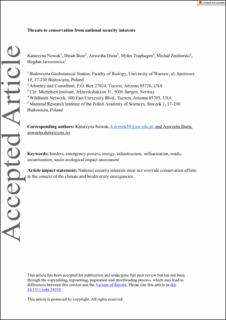| dc.description.abstract | There is a growing trend of nation states invoking national security and emergency declarations to build state-sponsored infrastructure projects, most commonly for border defense, energy production and transportation. Established laws, regulations, and agreements for the protection of nature and cultural heritage within and between countries, are becoming secondary to national security, compromising the function of protected areas like national parks, wilderness areas, and biosphere reserves, which safeguard biodiversity, climate, and human health. We describe cases where decades-long multinational cross-border endangered species recovery and rewilding programs have been jeopardized by waivers of environmental protection laws to facilitate rapid construction of border barriers that impede the movement and migration of animals, such as at the U.S.-Mexico and Poland-Belarus borders. Renewable energy megaprojects, like the Pinacate solar plant in Mexico, coupled with power transmission lines and road networks, likewise cast a large footprint on the land and are being carried out with minimal to no environmental compliance under the guise of national security, while similar projects like Mexico's Dos Bocas refinery and Poland's Vistula Spit canal proclaim national sovereignty as justification for bypassing laws. Increasing military expenditure by the world's largest economies has also created a mismatch with improvement in environmental policy stringency. These decisions trivialize our dependence on functioning ecosystems, undermine democratic principles and environmental review protocols, and contradict the UN resolution on the human right to a healthy environment. Framing projects as national security also foments civil and political unrest by the labeling and casting of dissenters, such as conservation scientists and environmental defenders, as anti-national. World leaders should refrain from misusing extraordinary powers, adhere to laws and international agreement | |
